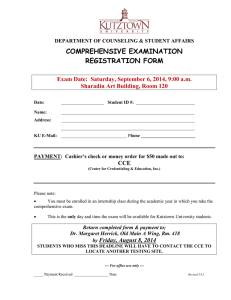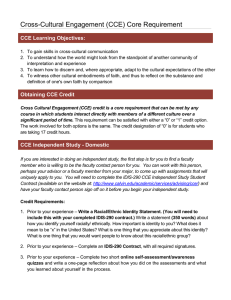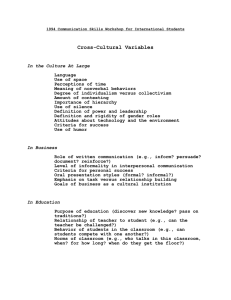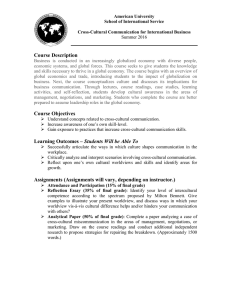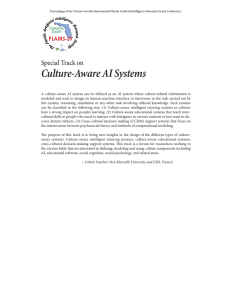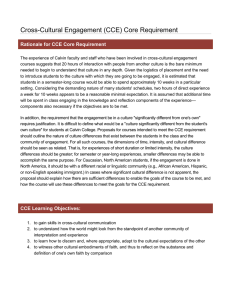Cross-Cultural Engagement (CCE) Core Requirement Credit Requirements:
advertisement
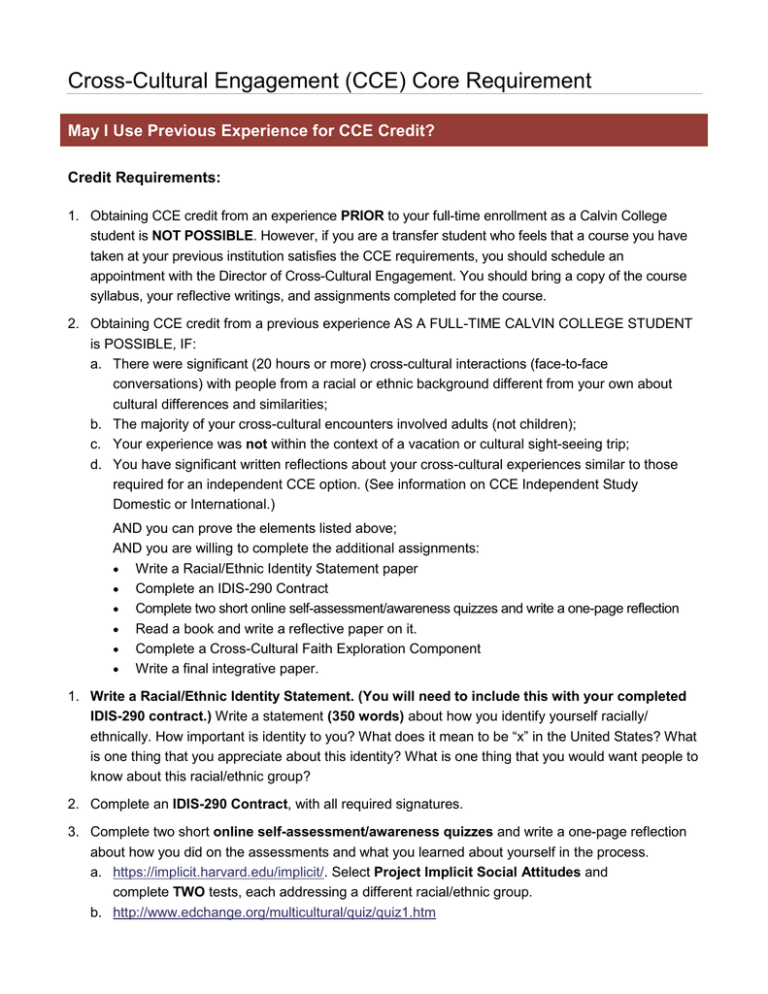
Cross-Cultural Engagement (CCE) Core Requirement May I Use Previous Experience for CCE Credit? Credit Requirements: 1. Obtaining CCE credit from an experience PRIOR to your full-time enrollment as a Calvin College student is NOT POSSIBLE. However, if you are a transfer student who feels that a course you have taken at your previous institution satisfies the CCE requirements, you should schedule an appointment with the Director of Cross-Cultural Engagement. You should bring a copy of the course syllabus, your reflective writings, and assignments completed for the course. 2. Obtaining CCE credit from a previous experience AS A FULL-TIME CALVIN COLLEGE STUDENT is POSSIBLE, IF: a. There were significant (20 hours or more) cross-cultural interactions (face-to-face conversations) with people from a racial or ethnic background different from your own about cultural differences and similarities; b. The majority of your cross-cultural encounters involved adults (not children); c. Your experience was not within the context of a vacation or cultural sight-seeing trip; d. You have significant written reflections about your cross-cultural experiences similar to those required for an independent CCE option. (See information on CCE Independent Study Domestic or International.) AND you can prove the elements listed above; AND you are willing to complete the additional assignments: Write a Racial/Ethnic Identity Statement paper Complete an IDIS-290 Contract Complete two short online self-assessment/awareness quizzes and write a one-page reflection Read a book and write a reflective paper on it. Complete a Cross-Cultural Faith Exploration Component Write a final integrative paper. 1. Write a Racial/Ethnic Identity Statement. (You will need to include this with your completed IDIS-290 contract.) Write a statement (350 words) about how you identify yourself racially/ ethnically. How important is identity to you? What does it mean to be “x” in the United States? What is one thing that you appreciate about this identity? What is one thing that you would want people to know about this racial/ethnic group? 2. Complete an IDIS-290 Contract, with all required signatures. 3. Complete two short online self-assessment/awareness quizzes and write a one-page reflection about how you did on the assessments and what you learned about yourself in the process. a. https://implicit.harvard.edu/implicit/. Select Project Implicit Social Attitudes and complete TWO tests, each addressing a different racial/ethnic group. b. http://www.edchange.org/multicultural/quiz/quiz1.htm 4. Read a book about Race Relations in the United States. You can, if you choose, read this book prior to your experience. Write a reflection paper (350 words) on the book. The reflection should highlight several key points, identify things that were particularly helpful to you, and include your emotional responses about what you read. Select a book from the list below: The Heart of Racial Justice by Brenda Salter McNeil and Rick Richardson (ISBN-10: 0830837221) Gather at the Table by Tom DeWolf and Sharon Morgan (ISBN-10: 0807014419) A Beginner’s Guide to Crossing Cultures by Patty Lane (ISBN: 978-0-8308-2346-8) Witnessing Whiteness by Shelly Tochluk (ISBN: 978-1-60709-257-5) Racism Without Racists by Eduardo Bonilla-Silva (ISBN-10: 1442202181) 5. Cross-Cultural Faith Explorations: Church Visit - Participate in a worship service associated with the racial/ethnic identity of your cultural informants. Write reflectively on this experience (350 words). 6. Final Reflective Paper (1500 – 2000 words): a. How did you meet the CCE objectives listed above? b. What lessons in cross-cultural interactions from this experience will have a lasting impact? c. How is what you learned about the nature of race relations from the readings different from and/or similar to what you learned about race relations from your cultural informant? d. In what ways does a faith perspective differ from a secular perspective in addressing race relations? Is this helpful? e. In what ways, if any, did your actual experience differ from what you thought this experience would be like? Explain. f. What steps will you take to further your cross-cultural experience and deepen your cultural knowledge? 7. Turn in all materials to your faculty advisor listed on your independent study contract by the last day of exams for the semester or interim in which you want your credit applied. CCE Learning Objectives: 1. To gain skills in cross-cultural communication 2. To understand how the world might look from the standpoint of another community of interpretation and experience 3. To learn how to discern and, where appropriate, adapt to the cultural expectations of the other 4. To witness other cultural embodiments of faith, and thus to reflect on the substance and definition of one's own faith by comparison
